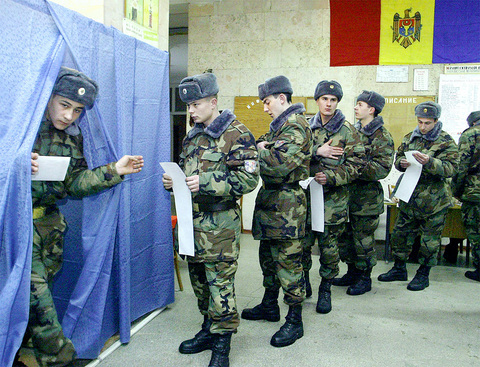Pro-Western Communists were favored to remain in power as Moldovans voted in parliamentary elections yesterday, but the party faced a challenge from centrists who prefer closer ties with Moscow.
Some 2.3 million Moldovans are eligible to vote in the parliamentary elections. Polls opened at 7am and were due to close at 9pm. More than half the electorate needs to vote for the elections to be valid.
Opinion polls gave the Communist party of President Vladimir Voronin about 46 percent support. The party has led the country since 2001 through four years of economic growth, but Moldova remains Europe's poorest country.

PHOTO: AFP
"I voted for the Communists because they look after the old people and they doubled my pension," said Ana Vasentciuc, 70, who has a monthly pension of just 437 lei (US$35), after she cast her ballot early yesterday.
Formerly pro-Russian, the Communists have made a complete turnaround and now support closer ties to the EU, which 65 percent of Moldovans favor.
Voronin fell out with Moscow over the future of the Russian-speaking separatist region of Trans-Dniester. He rejected a Russian-backed proposal in 2003 to federalize Moldova by giving Trans-Dniester statehood status, and he is now closer to the EU and to Romania's reformist President Traian Basescu.
The elections have raised tensions between Moldova and Russia, which fears it is losing influence in the former Soviet Union after the election of pro-Western leaders in Georgia and Ukraine last year.
Fifteen parties and alliances are contesting 101 seats in parliament. The lawmakers will then choose a president, with 61 votes in favor needed for the appointment.
``Voronin has raised pensions and salaries ... he has proved that he's interested in helping ordinary people,'' said 68-year-old Andrei Taru.
``It doesn't bother me that he was friends with Russia in the beginning and now he's friends with the Europeans and Americans,'' he said.
For the first time, exit polls will be released after the polls close, with early results shortly afterward. Final results are expected Wednesday.
Some 770 foreign observers, including 150 from the Organization for Security and Cooperation in Europe, will monitor the elections.
Nine special stations will be opened near the border with Trans-Dniester so the separatist region's 700,000 residents can vote. Trans-Dniester authorities have refused to allow any polling stations on their territory.
Russia put 1,800 of its peacekeepers on alert in the separatist region Saturday to prevent incidents, the Russian news agency Interfax reported.
Voronin's administration has been criticized for being heavy-handed with the opposition and tightly controlling the state media.
His party is challenged by a centrist alliance, the Democratic Moldova Bloc headed by Chisinau Mayor Serafim Urechean, which is pro-Moscow. The Bloc has about 16-20 percent support in opinion polls and has been bolstered by the Communists' deteriorating relations with the Kremlin.
The Popular Christian Democratic Party, which wants Moldova to join NATO and the EU, has been the Communists' main opponent in recent years. It is credited with about 10 percent voter support.

Indonesia yesterday began enforcing its newly ratified penal code, replacing a Dutch-era criminal law that had governed the country for more than 80 years and marking a major shift in its legal landscape. Since proclaiming independence in 1945, the Southeast Asian country had continued to operate under a colonial framework widely criticized as outdated and misaligned with Indonesia’s social values. Efforts to revise the code stalled for decades as lawmakers debated how to balance human rights, religious norms and local traditions in the world’s most populous Muslim-majority nation. The 345-page Indonesian Penal Code, known as the KUHP, was passed in 2022. It

US President Donald Trump on Friday said Washington was “locked and loaded” to respond if Iran killed protesters, prompting Tehran to warn that intervention would destabilize the region. Protesters and security forces on Thursday clashed in several Iranian cities, with six people reported killed, the first deaths since the unrest escalated. Shopkeepers in Tehran on Sunday last week went on strike over high prices and economic stagnation, actions that have since spread into a protest movement that has swept into other parts of the country. If Iran “violently kills peaceful protesters, which is their custom, the United States of America will come to

‘DISRESPECTFUL’: Katie Miller, the wife of Trump’s most influential adviser, drew ire by posting an image of Greenland in the colors of the US flag, captioning it ‘SOON’ US President Donald Trump on Sunday doubled down on his claim that Greenland should become part of the US, despite calls by the Danish prime minister to stop “threatening” the territory. Washington’s military intervention in Venezuela has reignited fears for Greenland, which Trump has repeatedly said he wants to annex, given its strategic location in the arctic. While aboard Air Force One en route to Washington, Trump reiterated the goal. “We need Greenland from the standpoint of national security, and Denmark is not going to be able to do it,” he said in response to a reporter’s question. “We’ll worry about Greenland in

Auschwitz survivor Eva Schloss, the stepsister of teenage diarist Anne Frank and a tireless educator about the horrors of the Holocaust, has died. She was 96. The Anne Frank Trust UK, of which Schloss was honorary president, said she died on Saturday in London, where she lived. Britain’s King Charles III said he was “privileged and proud” to have known Schloss, who cofounded the charitable trust to help young people challenge prejudice. “The horrors that she endured as a young woman are impossible to comprehend and yet she devoted the rest of her life to overcoming hatred and prejudice, promoting kindness, courage, understanding